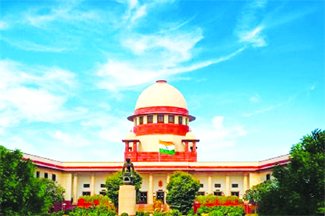New Delhi (TIP)- IN A reference to the Supreme Court, President Droupadi Murmu has posed 14 crucial questions over the top court’s April 8 verdict that fixed timelines for Governors and the President to act on Bills passed by state Assemblies. Seeking the Supreme Court’s opinion under Article 143(1), Murmu sought to know whether the actions of the Governors and President are justiciable and whether such timelines can be imposed on them in the absence of any such provision in the Constitution.
The reference pointed out that “there are conflicting judgments of the Supreme Court as to whether the assent of the President of India under Article 201 of the Constitution of India is justiciable or not”.
Under Article 145 (3), when the President makes a reference for the court’s opinion, it is placed before a five-judge bench. In the Ayodhya dispute, the apex court, citing pendency of the case, had declined to answer the question referred to it on whether a temple existed below the disputed structure.
Article 143 (1), which was invoked by the President to seek the court’s opinion, says that “if at any time it appears to the President that a question of law or fact has arisen, or is likely to arise, which is of such a nature and of such public importance that it is expedient to obtain the opinion of the Supreme Court upon it, he may refer the question to that Court for consideration and the Court may, after such hearing as it thinks fit, report to the President its opinion thereon”.
On April 8, the Supreme Court had set a timeline for Governors to act on pending Bills, and for the first time, prescribed that the President should take a decision on the Bills reserved for consideration by the Governor within three months from the date on which such reference is received. Under Article 201 of the Constitution, no timeframe has been set for a Presidential decision.
The top court had said that “in case of any delay beyond this period, appropriate reasons would have to be recorded and conveyed” to the state concerned.
The court, in its ruling, declared the action of Tamil Nadu Governor R N Ravi as illegal and erroneous in reserving 10 Bills for consideration of the President in November 2023 after they had already been reconsidered by the Assembly.
In her reference to the Supreme Court, President Murmu sought to know: “Is the exercise of constitutional discretion by the President under Article 201 of the Constitution of India justiciable? ?In the absence of a constitutionally prescribed timeline and the manner of exercise of powers by the President, can timelines be imposed and the manner of exercise be prescribed through judicial orders for the exercise of discretion by the President under Article 201 of the Constitution of India?”
Prez asks SC on assent to Bills: Can court impose timelines to decide?

Leave a Reply